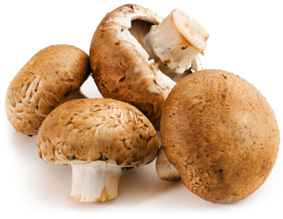 Mushrooms are classified as vegetables, but they aren’t technically plants, they belong to the fungi kingdom, and they contain important nutrients, vitamins, and minerals.
Mushrooms are classified as vegetables, but they aren’t technically plants, they belong to the fungi kingdom, and they contain important nutrients, vitamins, and minerals.
Mushrooms provide several important nutrients, as well as being low in sodium, fat, cholesterol, and calories. Mushrooms may help prevent chronic disease due to the presence of antioxidants and beneficial dietary fibers such as chitin and beta-glucans.
Mushrooms are rich in B vitamins such as riboflavin, folate, thiamine, pantothenic acid, and niacin. They are the only vegan, dietary source of vitamin D.
Mushrooms also provide several minerals such as selenium, potassium, copper, iron, and phosphorus.
Excellent source of selenium
Selenium is a mineral that is not present in most fruits and vegetables but can be found in mushrooms. It plays a role in liver enzyme function, and helps detoxify some cancer-causing compounds in the body. Several types of mushrooms are rich in this essential trace mineral: 100 grams of raw crimini have 47 percent of your daily needs, shiitakes have 45 percent and raw white button have 17 percent.
Rich source of Vitamin B2 and B3
Mushrooms contain high levels of vitamin B2 (riboflavin) and vitamin B3 (niacin): 100 grams (31/2 ounces) of crimini have 44 percent – that’s 30 percent of your daily recommended amount.
Rich source of Vitamin D
The vitamin D in mushrooms has been shown to inhibit the growth of cancer cells by contributing to the regulation of the cell growth cycle. The folate in mushrooms plays an important role in DNA synthesis and repair, thus preventing the formation of cancer cells from mutations in the DNA.
*Mushrooms that have been grown in the dark and have not been exposed to either sun light or by a brief zap of ultra violet light, will not contain the same levels of vitamin D.
Improves immune function:
Long chain polysaccharides such as alpha and beta glucan molecules, are responsible for the mushrooms’ beneficial effect on the immune system. Mushrooms may increase the production of antiviral and other proteins that are released by cells while they are trying to protect and repair the body’s tissues.
Selenium has also been found to improve immune response to infection by stimulating production of killer T-cells. The beta-glucan fibers found in the cell walls of mushrooms stimulate the immune system to fight cancer cells.
High in antioxidants
Antioxidants are the “substances” that help fight free radicals that are the result of oxidation in our body. Mushrooms contain just as high an antioxidant capacity as carrots, tomatoes, and red peppers.
So the next time you’re at the grocery store, try adding some mushrooms into your diet.


